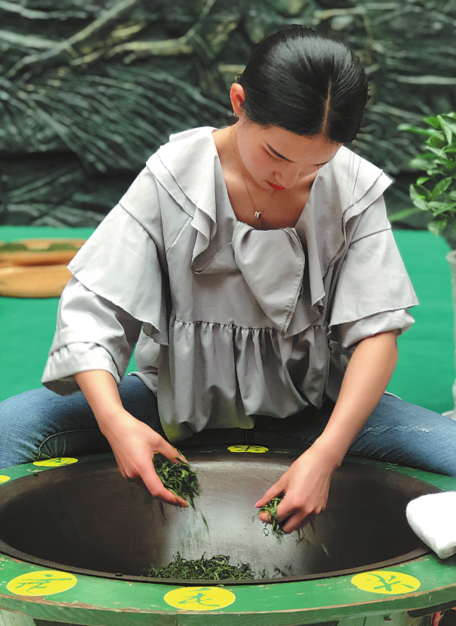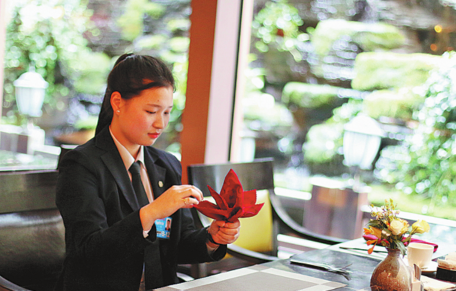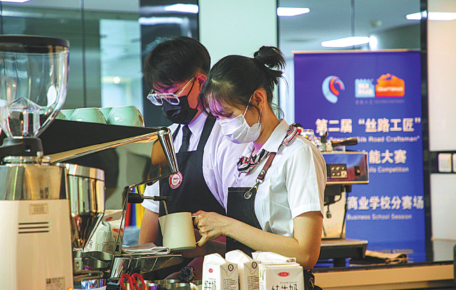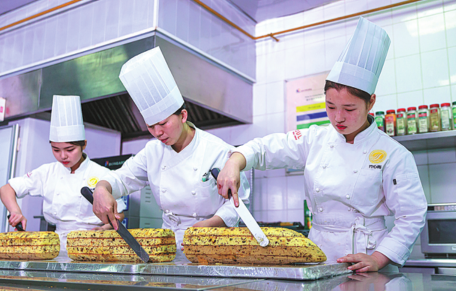Vocational schools cast off the shadow of stigma
Institutions pave way for their graduates to excel in the workforce

When Shi Xiao and her classmates at a secondary vocational school in Chongqing first placed their hands in a wok to heat fresh tea leaves, the heat was too much for many of them to bear.
However, their teachers from Chongqing Economy and Trade Secondary Vocational School told them they could not remove their hands from the tea leaves.
Unlike many of her classmates, Shi heeded the teachers' words. The temperature in the wok can rise to almost 300 C, and at the time Shi was only 15 years old.
"I remember my tears dropping into the wok and evaporating immediately. I thought about stopping, but I told myself I had to bear the pain, and somehow I just persisted," she said.
Now, the 21-year-old is a tea specialist at a restaurant in Chongqing, earning more than 5,000 yuan ($725) a month.
"Doing something I am passionate about gives me great joy, and I think that no matter what I do in the future, it will be closely associated with tea," Shi said.
She added that initially she knew little about tea, and her family did not want her to attend a vocational school.
In 2016, against her family's wishes for her to attend high school and go on to university, Shi left her hometown of Bijie, Guizhou province, for the vocational school in Chongqing, where she majored in tea processing.
"I was just not interested in learning from books, but wanted instead to leave home to try my luck in the outside world," she said.
The more Shi learned about tea making and processing, the more she became interested in it. In her three years at the vocational school, she took part in vocational skills competitions, winning provincial and national awards.
Processing a wok of tea usually takes two hours, but when she prepared for the competitions, she processed the tea for eight to 10 hours every day for a month to improve her skills.
"The secret is to ensure that your hands are inseparable from the tea leaves and that the leaves are inseparable from the wok," she said.
"I never regretted not attending high school and college. Seeing my friends at college taking all kinds of tests and wondering what their futures are, I feel lucky to have quickly found a career I am passionate about," Shi said.
High demand
Zeng Biao, vice-principal of Chongqing Economy and Trade Secondary Vocational School, said its tea-processing graduates are in high demand in the job market. They also never need to worry about finding work after they graduate.
Many of them have become tea specialists at their companies, with some even opening their own tea houses, he said.
China has a long tea culture history, so there is a huge demand for such specialists, but not all students can stomach the hard work involved in learning about tea processing, Zeng said.
The common belief that vocational school students are less successful than their college counterparts is due to shortcomings in national education evaluation standards, which focus too much on academic performance, Zeng said.
"Just because vocational school students are usually less successful academically than those from colleges does not mean they are less talented or less smart," he said, adding that vocational school students' talent lies in craftsmanship, dedication, practical skills and strong perseverance in self-improvement.
Graduating from Beijing Business School after two years, Ma Chunlei, 21, is now a manager at a recreational clubhouse in the city. He supervises a team of 10 people and is in charge of operations at the venue's restaurant.
Ma, who majored in restaurant management, said what he learned at the school has helped him a lot with his job. He was in charge of the school coffee shop, which gave him experience in management, he added.
He started work at the clubhouse when it opened two years ago, and believes that he has "grown a lot" in terms of doing his job well.
"I have always been good at dealing with people, and many of them say that I seem much more mature than my years," Ma said.
Sometimes, dealing with customers can be hard, but he tells himself to do the best he can and to try to avoid conflicts.
His supervisor has more than 20 years' experience in restaurant management, and Ma said he wants to learn as much as he can from him.
"I think it is a good thing to start work at a young age, as I can learn a lot from society. Rather than being book smart, I think I am street smart," he said.
Meanwhile, Liang Tong, a third-year student at Beijing Business School, said she chose to attend the institution to major in hotel management, even though her scores in the high school entrance exam were good enough for her to go to such a school.
Passionate about learning how to make coffee, Liang has an intermediate certificate from the Specialty Coffee Association, a nonprofit organization that represents thousands of coffee professionals, from producers to baristas worldwide.
Liang, who has worked at several coffee shops during the summer and winter vacations, said she can now make all kinds of coffee drinks on her own.
"Doing something I am interested in gives me a strong sense of achievement, and I am very happy doing my job," she said.
Hotel chefs
Hou Decheng, a senior teacher at Beijing Business School, has taught Western-style cooking in the city's vocational schools for 36 years.
Dismissing the deep-rooted stigma against vocational school students, Hou said graduates of such institutions have become highly successful and are not less talented than university graduates.
Some of his students have become head chefs at five-star hotels in Beijing, earning as much as 40,000 yuan per month, while others work at leading hotels in Hong Kong, Macao, Australia and the United States, he said.
However, Hou admits that most of his students cannot earn such high salaries. "The key factor preventing parents sending their offspring to vocational schools is that they are still underpaid (in the workforce) and are not well respected in society," he said.
Getting to the top in any profession is not easy, and becoming a successful chef requires extensive training and dedication, which most people cannot take, he added.
Jia Sulan, principal of Tianjin Zhonghua Secondary Vocational School, said some vocational school students do not receive enough attention from their teachers in middle school because their scores are not good enough.
After they go to vocational schools and learn a subject the students are truly passionate about, they finally get the opportunity to excel and gain confidence in themselves, she said, adding that receiving encouragement is important for a student's development.
Vocational schools do not assess students according to their exam scores, and as the whole mentality of schooling has changed, these students are no longer considered to have failed, she said.
In the 1980s, vocational schools were favored by students and parents, as graduates from these institutions could earn higher salaries than those from regular schools, Jia said. However, since the late 1990s and early 2000s, the popularity of vocational schools has gradually fallen, she added.
Since the 18th Communist Party of China National Congress in 2012, the central authorities have attached great importance to promoting vocational education, and have allocated more resources and funds to vocational schools, Jia said.
The newly revised Vocational Education Law, which took effect in May, is expected to improve the recognition for and status of vocational education by stressing that it is equally as important as regular education, Jia said.
The law also emphasizes that different levels of vocational education should be further integrated, so that students who want to pursue higher degrees are eligible to do so.
Vocational school graduates should also enjoy the same opportunity to access higher levels of education, employment and career development as regular school graduates, the law states.
Si Huabeijiao, 21, a student majoring in photovoltaics at Tianjin Light Industry Vocational Technical College, said she has always regretted failing to achieve a high score in the national college entrance exam, or gaokao.
She has worked extra hard at the college and has taken part in vocational skills competitions. Si and her team recently won the gold medal at the World Vocational College Skills Competition in Tianjin.
She said she still wants to be admitted to a regular college, and to even pursue a postgraduate degree.
Jia said the law has broken the glass ceiling of vocational school students obtaining bachelor's and higher degrees, so they will no longer be discriminated against in the job market due to their academic background.
"The law really ensures that vocational school students have brighter prospects, whether they want to find a job or pursue a higher degree. I am confident that within a couple of years, the attractions of vocational education will improve greatly," she added.





Today's Top News
- Xi's speech at Central Urban Work Conference to be published
- China completes over 8 million hectares of land greening in 2025
- FTZ helps Kashgar invigorate regional commerce
- Canada, China should eye a fresh start
- US playing with fire on thin Arctic ice
- Party conduct key to clean governance






























